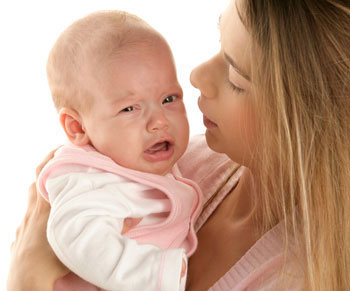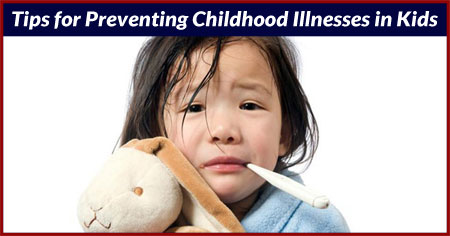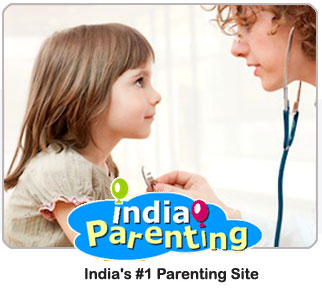Sneezing problem in newborns is common. There are several factors which can cause sneezing in newborns. However, parents should be careful if sneezing is accompanied by fever. Read on to know more about the common causes of sneezing in infants. Frequent sneezing in newborn babies is nothing to really worry about. The air we breathe in has a lot of impurities in it- dust, pollutants, germs, chemical fumes and such other undesirable substances. Sneezing in fact helps to clear such impurities from the nose which we breathe. Sometimes when infants vomit, milk too can enter their nose. Sneezing helps to clear milk and mucous from the nose. In case sneezing is accompanied by fever or cough it may be something serious which may require medical intervention. Our nose basically acts as a filter. When anything irritates the nose, for example dust, this causes and increased flow of blood to the nose resulting in swelling of the nasal tissues. This in turn causes mucus to be produced in the nose and makes the person sneeze. The mucus helps to eliminate the inhaled impurities from our body. In this articleDry AirIrritant in Air AllergiesInfluenza or Colds Decongestant Sprays Causes of Sneezing in Newborns Newborn babies sneezing can be caused due to a number of reasons some of which are: Dry Air Nasal passages of newborn babies are very tiny. This may result in the natural secretions of the nose drying out very fast especially during winters. As a result the newborn may experience nasal discharge, sneezing and noisy breathing. Making use of vapouriser will be useful to increase humidity and reduce nasal dryness in infants. Irritant in Air Irritants in the air we breathe like dust, cigarette smoke and at times milk which can enter an infant’s nose when she throws up can cause irritation and frequent sneezing in newborn babies. Sneezing basically helps to eliminate the unwanted irritants inhaled by the newborn.Allergies Sneezing and nose congestion can happen in newborn babies because of hay fever which is also referred to as seasonal allergic rhinitis. This condition is basically caused due to allergic reaction to substances in the air like pollen which can enter the nose, sinus, throat and eyes. Animal hair, insect bites and house dust are some of the other things capable of causing allergies in a newborn baby. The best way to avoid such allergies is to stay away from the source which causes it. However, this may not be always possible in which case doctors normally prescribe anti histamines. Influenza or Colds Sneezing, nasal discharge and upper respiratory tract infection are common symptoms of cold in newborn babies. Newborn babies have a very weak immune system. They can easily catch a cold even if they are held by an adult who is already infected with cold or influenza. Hence doctors always recommend washing hands with a disinfectant before handling a newborn baby. Colds must be treated in a newborn immediately upon identification to avoid the infant contracting secondary bacterial infections at a later stage. Decongestant Sprays Decongestant sprays are not advisable for use in infants. In fact sprays must be used in children under the age of six years only if recommended by a doctor. Decongestant sprays are addictive and capable of causing damage to the delicate tissues of a newborn baby’s sinuses and nose. To relieve congestion in infants it is best to make external use of a vapouriser. Sneezing problem in newborn babies is quite common and nothing to be alarmed about. Newborn babies sneezing can happen due to a number of reasons which include dry air, irritants, colds and influenza, allergies and nasal sprays. There is no need to call a doctor to treat frequent infant sneezing. In case an infant is otherwise well, is taking her regular feed and does not have fever parents can stay assured that sneezing problem in the infant will get resolved on its own.
Sneezing problem in newborns is common. There are several factors which can cause sneezing in newborns. However, parents should be careful if sneezing is accompanied by fever. Read on to know more about the common causes of sneezing in infants. Frequent sneezing in newborn babies is nothing to really worry about. The air we breathe in has a lot of impurities in it- dust, pollutants, germs, chemical fumes and such other undesirable substances.
Sneezing in fact helps to clear such impurities from the nose which we breathe. Sometimes when infants vomit, milk too can enter their nose. Sneezing helps to clear milk and mucous from the nose. In case sneezing is accompanied by fever or cough it may be something serious which may require medical intervention.
Our nose basically acts as a filter. When anything irritates the nose, for example dust, this causes and increased flow of blood to the nose resulting in swelling of the nasal tissues. This in turn causes mucus to be produced in the nose and makes the person sneeze. The mucus helps to eliminate the inhaled impurities from our body.
Causes of Sneezing in Newborns
Newborn babies sneezing can be caused due to a number of reasons some of which are:
Dry Air
Nasal passages of newborn babies are very tiny. This may result in the natural secretions of the nose drying out very fast especially during winters. As a result the newborn may experience nasal discharge, sneezing and noisy breathing. Making use of vapouriser will be useful to increase humidity and reduce nasal dryness in infants.
Irritant in Air
Irritants in the air we breathe like dust, cigarette smoke and at times milk which can enter an infant’s nose when she throws up can cause irritation and frequent sneezing in newborn babies. Sneezing basically helps to eliminate the unwanted irritants inhaled by the newborn.
Allergies
Sneezing and nose congestion can happen in newborn babies because of hay fever which is also referred to as seasonal allergic rhinitis. This condition is basically caused due to allergic reaction to substances in the air like pollen which can enter the nose, sinus, throat and eyes. Animal hair, insect bites and house dust are some of the other things capable of causing allergies in a newborn baby.
The best way to avoid such allergies is to stay away from the source which causes it. However, this may not be always possible in which case doctors normally prescribe anti histamines.
Influenza or Colds
Sneezing, nasal discharge and upper respiratory tract infection are common symptoms of cold in newborn babies. Newborn babies have a very weak immune system. They can easily catch a cold even if they are held by an adult who is already infected with cold or influenza. Hence doctors always recommend washing hands with a disinfectant before handling a newborn baby. Colds must be treated in a newborn immediately upon identification to avoid the infant contracting secondary bacterial infections at a later stage.
Decongestant Sprays
Decongestant sprays are not advisable for use in infants. In fact sprays must be used in children under the age of six years only if recommended by a doctor. Decongestant sprays are addictive and capable of causing damage to the delicate tissues of a newborn baby’s sinuses and nose. To relieve congestion in infants it is best to make external use of a vapouriser.
Sneezing problem in newborn babies is quite common and nothing to be alarmed about. Newborn babies sneezing can happen due to a number of reasons which include dry air, irritants, colds and influenza, allergies and nasal sprays. There is no need to call a doctor to treat frequent infant sneezing. In case an infant is otherwise well, is taking her regular feed and does not have fever parents can stay assured that sneezing problem in the infant will get resolved on its own.































